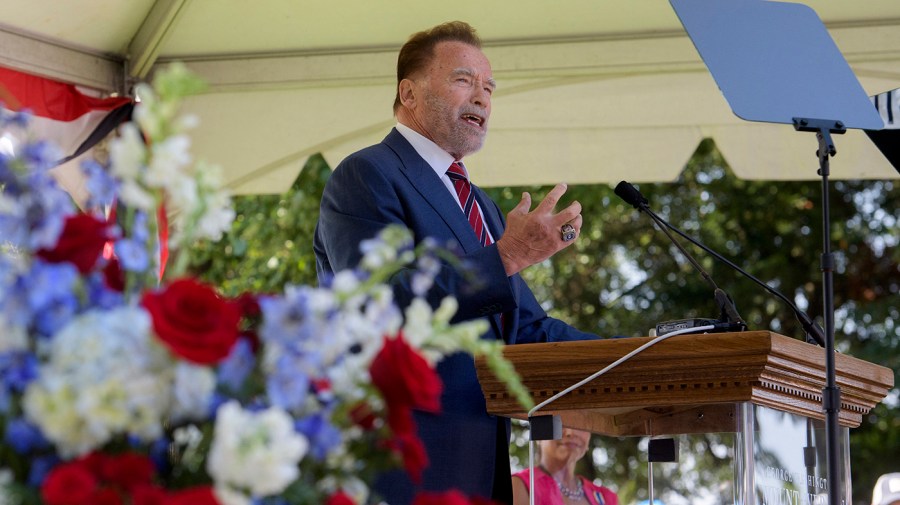Arnold Schwarzenegger has re-entered the political scene, advocating against partisan redistricting in California. The former governor is rallying support to “terminate gerrymandering,” aligning with notable figures like former House Speaker Kevin McCarthy and investor Charlie Munger. Their opposition centers on a proposed redistricting plan that could potentially secure five additional House seats for Democrats by circumventing California’s independent redistricting commission.
Schwarzenegger, who championed the establishment of this commission during his time as governor, views the current efforts as a direct threat to the legacy he built. Political analysts suggest that his involvement reflects a desire to defend his contributions to electoral reform. Dan Schnur, a former Republican strategist and current professor at the University of California at Berkeley, noted, “Schwarzenegger was and is a Republican, but there are certain issues that separate him pretty dramatically from the party mainstream.”
California Democrats, led by Governor Gavin Newsom, are pushing for a special election on November 4 to pass a ballot measure that would allow the legislature to implement new district lines mid-decade. This plan has been positioned as a necessary response to similar redistricting maneuvers in Republican-controlled Texas, where recent changes could yield five additional House seats for the GOP. Newsom has characterized the Texas approach as an attempt by Republicans to manipulate the upcoming midterm elections.
In a statement to the Houston Chronicle, Schwarzenegger condemned actions in both states, asserting, “It is very wrong what they’re doing to Texas and it is very wrong what they’re trying to do in California. It is not at all serving the people. It is serving the party.” His commitment to nonpartisan redistricting reflects his long-standing advocacy for electoral reform, which began even before his gubernatorial run.
During his two terms as governor, Schwarzenegger supported initiatives in 2008 and 2010 that established and expanded California’s independent redistricting commission. In a mid-August interview with the New York Times, he emphasized his intention to preserve the system he helped create, stating, “It’s nothing personal. I want to defend the promise of citizen-led redistricting.”
Schwarzenegger’s efforts are seen as a significant component of his legacy, according to Mike Madrid, a Republican strategist and co-founder of the Lincoln Project. Madrid remarked, “It’s definitely a legacy play for Schwarzenegger, but it also has the benefit of being something that he has long believed.”
The upcoming special election is anticipated to become one of the most contentious and expensive ballot measure campaigns in California’s history. Funding for the campaign has already surpassed $13 million in support and $10 million in opposition, as reported by the California Secretary of State. Munger has contributed a significant portion of the opposition funds, highlighting the intense financial stakes involved.
In addition to campaigning, California Republicans have filed two petitions aimed at halting the redistricting plan, though both were rejected by the state Supreme Court. Political experts expect further legal challenges to emerge. The top Republican in the California Assembly recently proposed a “two state solution,” suggesting a division of California to accommodate its more conservative regions. Although this idea is not viewed as feasible in the Democratic-controlled legislature, it underscores the fervor of the Republican response to the redistricting plan.
As the political landscape evolves, Democrats are also framing the redistricting dispute as a referendum on former President Donald Trump. Newsom has openly discussed his conversations with Schwarzenegger regarding the issue, underscoring their shared belief in the importance of independent redistricting. He stated, “We’re actually protecting his legacy by maintaining the independent redistricting and affirming it.”
In the coming weeks, Schwarzenegger has indicated that he will ramp up his efforts against Proposition 50, including selling merchandise on his “Arnold’s Pump Club” site to support the cause. Proceeds are being directed to the California and Texas branches of the League of Women Voters, a nonprofit organization opposing partisan redistricting.
As both sides gear up for the November election, the contention surrounding redistricting in California is poised to capture national attention, reflecting broader themes of electoral integrity and political strategy in the United States.
